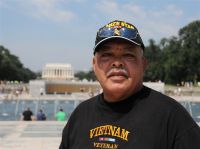WASHINGTON — Saint Silver is considered a disabled veteran. Post-traumatic stress disorder, sleep apnea, and diabetes related to Agent Orange exposure have affected him since he served in Vietnam. But he doesn’t look back in anger. He looks back with appreciation for the service.
In fact, he said, serving in the Army was the best thing that happened to him.
“Being in Vietnam … you can’t forget it. It’s something that stays with you for the rest of your life,” Silver said. “Being a veteran is the best thing that happened to me.” He’s grateful that he was able to serve his country, he said.
“I think that every young man, when he turns 18, should be obligated to serve the country,” he said. “I think we’d have less crime, less killing one-on-one. The military gives you some stability, and you learn to grow up and be a man.”
The Henderson, N.C., resident said serving in the Army helped to shape him as an adult, and his service abroad taught him to appreciate the things some take for granted in the United States.
“Once you get back home, you realize how much you love our country, and how much freedom you have in a democracy versus communism over there, where you’re told what to do and when to do it,” Silver said.
Silver served as a clerk in the Army from 1968 to 1971, though he said he never worked in his specialty. Instead, he was a utility supervisor, advising Vietnamese in the Mekong Delta, where he never thought he’d end up.
“They told me I passed the physical in January, and I’d be drafted the next month,” Silver said. “So I volunteered, thinking I’d miss Vietnam. But right after [specialty training], I went straight over to Vietnam.”
Vietnam was a good cause, Silver said, and the lessons learned there should be kept in mind when considering drawdowns and missions in Iraq and Afghanistan. He said he believes the United States pulled out of Vietnam too soon, resulting in continued problems for the Vietnamese people.
“If we do like we did in Vietnam, leaving before the job is finished, other countries will think they can’t depend on us,” he said. “If you consider yourself an ally of another country, you should be able to stay and help them through what they’re going through before you leave. Americans never really lost the war over there. It was the counterparts that lost. We didn’t lose.”
The wars in Iraq and Afghanistan shouldn’t deter people considering military service today, Silver said. The benefits, both tangible and invisible, outweigh the risks of combat, he added.
“Once I got out, I wish I had stayed in,” he said. “Where can you go and get 30 vacation days a year? You get hospitalization, and you don’t have to worry about it. Plus, it makes you grow up. You get a skill. After 20 years you can retire to another job. It has so many opportunities, and positives, in spite of the war.”
All young people don’t think that way, he acknowledged. “But as you get older, you realize all of the things you missed by not staying in,” he added.
(“Veterans’ Reflections” is a collection of stories of men and women who served their country in World War II, the Korean War, the Vietnam War, operations Desert Shield and Desert Storm, and the present-day conflicts. They will be posted throughout November in honor of Veterans Day.)
Source:
U.S. Department of Defense
Office of the Assistant Secretary of Defense (Public Affairs)

 von
von 